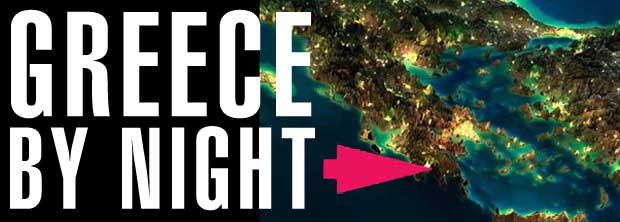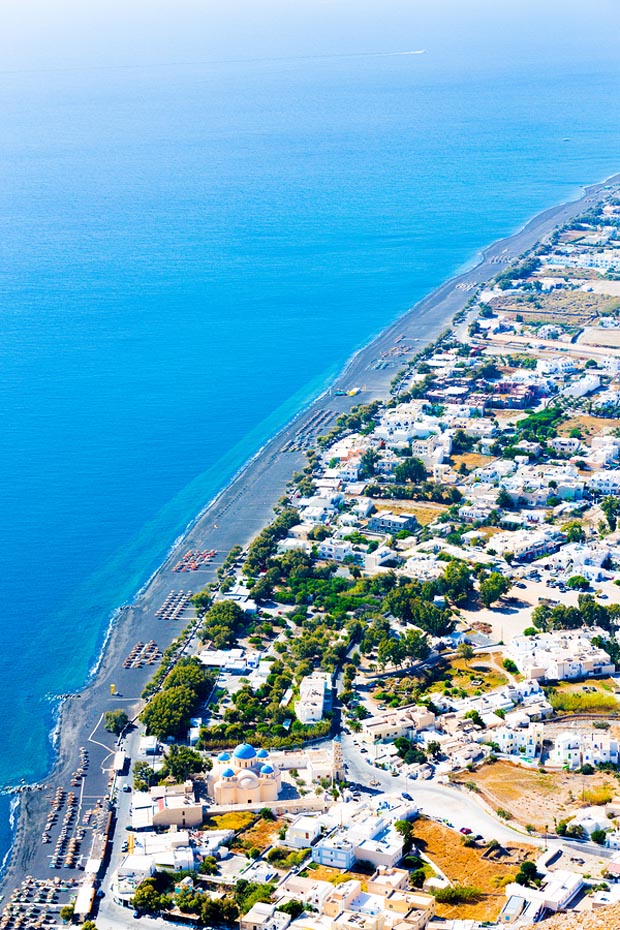Greece and the economic crisis 2015
NEWS ARCHIVE - May 27 - May 31
May 31, 2015
Greece, economy, bond purchases top agenda of ECB meet - Agence France"Greece is likely to be the other key talking point at the meeting, given the absence of any agreement so far between Athens and its creditors, analysts said.
ECB chief Draghi attended a meeting of finance ministers and central bank governors of the so-called Group of Seven countries in Dresden last week, where the efforts to hammer out a deal and prevent a disastrous "Grexit" or Greek exit from the eurozone took centre stage.
"We suspect that Draghi and colleagues will maintain a hard line on Greece," said Loynes. The ECB will also publish Wednesday its latest updated forecasts for growth and inflation in the 19 countries that share the euro."
Greek Bank Run Continues; Greek Domestic Deposits Lowest In Decade - Forbes
"Here’s what the problem is. Banks are vital to the functioning of an economy: quite apart from anything else we’ve got to have the simple money transfer ability of the modern financial system. We also need their ability to provide credit and, as we all know, banks extending credit is what produces the vast majority, over 90%, of the money supply in a modern economy. To do all of that banks must actually have money inside them. Normally this is provided by the deposits that we all make into them. So, everyone withdraws their money and the banks are bust.
Sure, this isn’t happening yet in Greece. But when or if it does it’s known as a bank run: the banks fail because they cannot get back the money they’ve lent out as quickly as people want their deposits back. They’re illiquid, even if not insolvent. We do have ways to deal with this: unlimited lending from the central bank against security or collateral is the normal answer. However, here we’ve another problem from the set up of the euro. The Bank of Greece is now only a branch office of the European Central Bank. And it can’t print its own money: it must ask the ECB if it may. And that ability to print money is limited by something called the ELA. Emergency Lending Assistance. This is limited as a method of stopping the Greek government funding itself through the banks."
May 30, 2015
€800 million bank run sparks fears of Greek exit from single currency - UK Express
"A staggering €800 million (£570 million) has been pulled out of Greek banks in less than 48 hours, sparking fears of a major bank run.
Jack Lew, the US Treasury secretary, warned a deal must be reached now and the minor details sorted out later, otherwise "an accident" could unfold forcing Greece from the Eurozone.
...Deposits by households and businesses plumetted to around €133 billion ($94 billion) in April, from around €138 billion (£98 billion) in March - a 3.6 per cent monthly drop and over €100 billion below the September 2009 peak."
Greece open to compromise: Voutsis - Yahoo FInance
"We believe that we can and we must have a solution and a deal within the week," Interior Minister Nikos Voutsis, who is not involved in Greece's talks with the lenders, told Skai television.
"Some parts of our program could be pushed back by six months or maybe by a year, so that there is some balance," he said.
He did not elaborate on what parts of the ruling Syriza party's anti-austerity program could be pushed back, but the comments suggested a greater willingness to compromise on pre-election pledges."
As Insults Fly in the Greek and German Media, Some Wish for Less News - NY Times
"As a nightly news anchor for Skai TV in Greece, Sia Kossioni closely monitors Germany, checking the latest remarks from German politicians, studying public opinion polls and reading the German news media to learn what they are saying about the Greek bailout negotiations. She even speaks German.
Ms. Kossioni is not alone in her obsession — the entire Greek news media is obsessed with Germany. (The German media is fascinated with Greece, too.) This is not surprising, given that Greece is staring at default on its debt and economic disaster, possibly as early as June, unless it can reach a deal with creditors — and Germany is its biggest creditor and the most immovable objector to concessions.
So every blunt utterance from Wolfgang Schäuble, Germany’s finance minister, can dominate the news, as can the typically more opaque remarks from Chancellor Angela Merkel. Even backbench German lawmakers — whose views might be ignored in their own country’s news media — can merit airtime in Greece by tossing a rhetorical grenade about the bailout. "
May 29, 2015
Greece Thinks It Can Hold Out for Another Week Without a Deal - Yahoo - Bloomberg"Euro-region finance officials told Greece in a teleconference this week that there won’t be time to get a disbursement approved by European parliaments before the bailout expires at the end of June unless they reach a technical agreement next week. With the clock ticking, European policy makers in the German city of Dresden for a Group of Seven meeting said a deal to unlock aid was still not in sight after months of negotiations.
...Greece will be able to scrape together enough cash to make a payment of about 300 million euros ($329 million) due to the IMF on June 5, Economy Minister George Stathakis said in an interview with Real News newspaper published Friday. "
Greece, Lagarde and the Now-Unstoppable Ride to Austerity - WSJ Moneybeat
"With each passing day, the prospect for a Greek default grows and, thus, the risk of a Greek exit from the euro. The timing’s so tight that even Christine Lagarde, head of the International Monetary Fund, one of Greece’s trio of international rescuers/creditors, reportedly acknowledged that the country could end up having to leave the single currency.
Whether Mrs. Lagarde’s purported warning is sincere or a means of urging Greece to hasten its negotiations is unclear. Whichever path it chooses, or is forced to take, Greece’s Syriza government will end up with exactly what it has campaigned so hard against: austerity. Because whether it capitulates in its negotiations or not, Greece has some more belt tightening ahead. In fact, over the near term, austerity within the eurozone would probably be considerably less severe than austerity out of it.
...A banking panic and capital controls would weigh heavily on the economy. Growth would take another hit–by some estimates the Greek economy would shrink by another fifth or so if it ends up being forced out of the euro."
Tsipras Talks With Merkel, Hollande Amid Lack of Bailout Progress - WSJ
"Greece aims to have an agreement with its international creditors by Sunday, a government spokesman said Thursday, despite warnings from European officials that the country is still far from offering sufficient economic overhauls to unlock bailout cash
“The optimism expressed by the Greek government is based on actual facts,” government spokesman Gabriel Sakellaridis told reporters. “The conditions are ripe to have a deal.”
But European officials said Thursday that the two sides remain far apart on several issues and that further progress is needed in the technical talks, reining in expectations for an imminent deal."
Greece could use 'Zambia' option as progress on deal unclear - SF Gate
"Countries do have the option of bundling when they have a series of payments in a given month ... making a single payment at the end of that month," IMF spokesman William Murray said in Washington.
He said Athens hadn't made a request to combine repayments, adding that the last country to do so was Zambia three decades ago."
Greece euro exit 'a potential': Christine Lagarde - Economic Times
"A Greek exit is "a potential," Lagarde told the daily Frankfurter Allgemeine Zeitung.
Such a scenario would not be "a walk in the park" for the single currency area, but would "probably not be an end to the euro," she said in comments translated into German.
"It's a complicated issue and it's one that I hope the Europeans will not have to face because hopefully they will find a path to agree with the future of Greece within the eurozone," she said in a statement subsequently issued in Washington to clarify her comments to the German newspaper.
The IMF chief also rejected Athens' assertion that a deal with its creditors was imminent."
May 28, 2015
Grexit is a possibility, warns Christine Lagarde - UK Guardian"The IMF head is attending a meeting of finance ministers and central bankers from the G7 leading nations in Dresden, where the crisis in Greece was discussed, though it was not on the formal agenda.
Her comments came as Athens’ lead negotiator admitted Greece requires intervention at the highest political level in Europe in order to seal an agreement, after acknowledging that ongoing negotiations in Brussels will not achieve a final deal.
Euclid Tsakalotos, the deputy foreign minister who is now leading Greece’s negotiating team, said both sides were drawing closer together but a final “trade-off” would have to take place between senior political figures. "
Tsipras faces tough choices in shrinking window for aid deal - Economic Times
The government is talking up chances of an aid-for-reform agreement before a roughly 300 million euro payment falls due on June 5 to the International Monetary Fund, which along with the euro zone funds Greece.
"Based on the ground we have covered in the negotiations we believe we are close to a deal," government spokesman Gabriel Sakellaridis said, adding a deal was likely by Sunday.
Time is running out. A deal must be concluded before the current bailout expires at the end of June to ensure aid of 7.2 billion euros from the programme is paid out.
In practice, that means a draft agreement is needed by the end of next week, leaving almost four weeks for approval by the lending institutions, finance ministers and some national parliaments before aid is disbursed, a euro zone source said.
Greece Remains More Optimistic Than Its Creditors - Bloomberg
"Greece once again expressed optimism that the country will reach a deal with creditors in the coming days, only to have that confidence knocked down by international officials.
The most recent vow came Thursday from the government’s chief spokesman -- who said an agreement could be hammered out by Sunday -- even as international creditors lined up to insist the two sides are still far apart and a lot of work remains.
“This optimism is not just words, it is based on the experience of the previous weeks and the progress achieved,” spokesman Gabriel Sakellaridis told reporters in Athens. “In cooperation with creditor institutions and our partners, we are making sure that there won’t be a chance of default.”
Prime Minister Alexis Tsipras’s government has promised on a number of occasions in past months that it was close to sealing a deal --- most recently at the end of April when Greek officials argued an agreement could be reached by May 3 -- only to have no accord come to pass. As the deadlines come and go, Greece has managed to scrape together enough funds to pay the bills and limp along.
“Greek governments have generally tended to over stress the prospects of review conclusion over the last few years and the new Syriza-led government is no exception to the rule,” said Lefteris Farmakis, an analyst at Nomura International Plc in London. “There is little evidence of substantial progress on a number of key review issues.”
Greece owes 1 billion euros to pharmaceutical companies - Neo Kosmos
"Cash-strapped Greece has racked up mounting debts with international drugmakers and now owes the industry more than 1.1 billion euros, a leading industry official said on Wednesday.
The rising unpaid bill reflects the growing struggle by the nearly bankrupt country to muster cash, and creates a dilemma for companies under moral pressure not to cut off supplies of life-saving medicines.
Richard Bergstrom, director general of the European Federation of Pharmaceutical Industries and Associations, told Reuters his members had not been paid by Greece since December 2014. They are owed money by both hospitals and state-run health insurer EOPYY.
Drugmakers and EU officials are now discussing options in the event Greece defaults on its debt or leaves the eurozone, disrupting imports of vital goods, including medicines."
Creditors doubtful as Greece predicts bailout deal by Sunday - UK Guardian
"In Athens, protesters are holding an anti-austerity rally outside the Ministry of Employment - a sign of the domestic pressure the government faces to get a ‘good’ deal. "
U.S. Index Futures Fall After Nasdaq Record Amid Greece Concerns - Bloomberg
"European officials rebuffed Greek claims that a deal with creditors is near as they arrived in Dresden for a meeting of the Group of Seven finance chiefs. While Greece isn’t on the G-7’s official agenda, the topic may dominate discussions on the sidelines, as ministers from the world’s biggest economies urged a resolution of the crisis to stop it from spilling beyond Europe’s borders.
A report showed jobless claims increased by 7,000 to 282,000, and remained below 300,000 for the 12th straight week. Investors will also watch a report on housing this morning for further clues on the timing of a Federal Reserve interest-rate increase. Pending home sales rose at a slower pace in April, according to economists’ forecasts.
An estimate on Friday may also show the U.S. economy contracted in the first quarter, compared with a prior reading showing growth. Fed policy makers are preparing to raise rates that they’ve held near zero since December 2008, with economists expecting a first increase in September, according to a Bloomberg survey."
Greek debt in 2015 - €316 billion
- ECB - 62%
- Eurozone - 14%
- IMF - 9%
- Greek Banks - 5%
- Greek non-banks - 3%
- Other European Banks - 3%
- Non-European Banks - 2%
- Non-Greek non-banks - 2%
Source: UK Telegraph Newspaper
See the 2011 list ($70 billion)
Perissa Beach, Santorini
May 27, 2015
Greece claims deal is close, but creditors unconvinced - UK GuardianDeal or no deal - markets went for the former, and moved higher on hopes that Greece was about to come to an arrangement with its creditors. Whether that was the case or not, investors decided to push shares higher anyway.
Time Politicians Handed Greece an Ultimatum - WSJ
"Until now, Europe’s political leaders have been reluctant to be drawn into the process, preferring to hide behind the officials in the institutions formerly known as the Troika: the European Central Bank, the International Monetary Fund and the European Commission. Partly, that reflects practical and legal reality: elected politicians do not have the capacity or capability to negotiate the details of bailout programs.
...But these assumptions look increasingly misplaced. For all Syriza’s talk of tackling corruption and clientelism in Greece, it has shown little interest in reform in its first four month in power. It has come up with no ideas of its own to turn Greece into a functioning modern economy. Instead, it appears to be more interested in turning back the clock. At a meeting last week, 75 out of 160 senior Syriza members voted for an immediate “rupture” with creditors. The other 95 backed a compromise proposal from Mr. Tsipras to continue the negotiations but set red lines on reform of pensions and labor laws that the creditors will never accept, raising the possibility that Mr. Tsipras might struggle to get his party behind a deal.
The danger of an accident is now extremely high. Greece owes €1.6 billion ($1.74 billion) to the IMF in June and some government officials have warned that without a deal it is likely to miss a payment."
U.S. Urges Greece, Creditors to Strike Debt Deal - WSJ
"A senior European Commission official said Wednesday that technical negotiations between Greece and its creditors have shown some progress though he warned that time is running out to reach a final agreement.
“There are a number of areas we are making some progress on,” said Valdis Dombrovskis, Vice President at the European Commission, the European Union’s executive arm, citing Greek proposals on VAT, a sales tax.
“It is also clear that we need to reach this deal very quickly because we are already a month behind the original schedule,” he added. A deal reached in February to extend Greece’s bailout by four months suggested that technical discussions between Greece and the institutions should be completed by the end of April."
Greece and creditors play down fears of imminent default - Reuters
"Running short of cash to pay public sector salaries, pensions and debt obligations, senior members of Prime Minister Alexis Tsipras's government have said openly that Greece does not have the money to pay 300 million euros (212 million pounds) to the IMF on June 5.
The threats have spooked financial markets, which fear a default could forces Greece out of the single currency, pushing the European and global economies into uncharted territory.
Still, the government on Monday reiterated that it would try to make the payment and Finance Minister Yanis Varoufakis expressed confidence a deal with lenders would be struck in time to avoid default. Asked if Athens could make the payment, he said: "Of course, because there will be a deal by June 5."
Meet One of the Most Hated Men in Greece - Bloomberg
"...the 60-year-old Danish economist is holding his ground against Syriza economic plans that fail to meet International Monetary Fund criteria for putting Greece’s debt on a sustainable path. And this time, the nation’s membership in the euro and the IMF’s credibility hang in the balance as Greece runs low on cash and European leaders look to the fund’s blessing before disbursing more bailout money.
The situation has Thomsen, whose thesis adviser was an architect of the euro, in the role of helping decide the currency’s fate. Thomsen has been closely involved with the Greek bailout since its inception in 2010, and often represents the fund at meetings of euro-area finance ministers, where officials from the European Commission and European Central Bank also typically attend. Those two institutions and the IMF form the so-called troika of Greek creditors.
“That deal in December was a hugely missed opportunity,” said Martin Edwards, an international-relations professor at Seton Hall University in South Orange, New Jersey, who has researched IMF lending programs. “They moved from having a moderately cooperative government to one that wasn’t going to be in their corner. This is a problem of their own devising.”
A guide to Greece’s debt crisis and what’s at stake - Salt Lake Tribune
"...Greece has a heavy debt repayment schedule in the next three months, with $1.7 billion due to the IMF in June alone, with just over $321 million due June 5.
But having received no significant rescue loans since last August, it is now struggling to make ends meet by scraping together any cash it can find...
...Missing an IMF repayment doesn't automatically mean Greece is in default. The IMF's rules say that would only be declared once a payment is one month overdue.
But failing to repay its debts could rock the country's markets and further hammer whatever confidence was left among investors and Greeks. Greece could have to put restrictions on money transfers and withdrawals to prevent panicked depositors from withdrawing their money in droves and bringing down the banking system"
Greece Considers Levy on Some Deposits - The Ledger
"Greece is proposing to legalize tax-dodgers' undeclared money for a fee, a way to raise money as the country tries to reach a deal with creditors to get more bailout money and avoid default.
Finance Minister Yanis Varoufakis said Tuesday he is considering a 15 percent levy on undeclared foreign deposits, and double that rate on undeclared deposits in domestic banks, as an enticement for tax-dodgers to legalize their assets."
White Egremni Beach - Lefkada
NEWS ARCHIVE - May 2015



Greece's Golden Visa program


